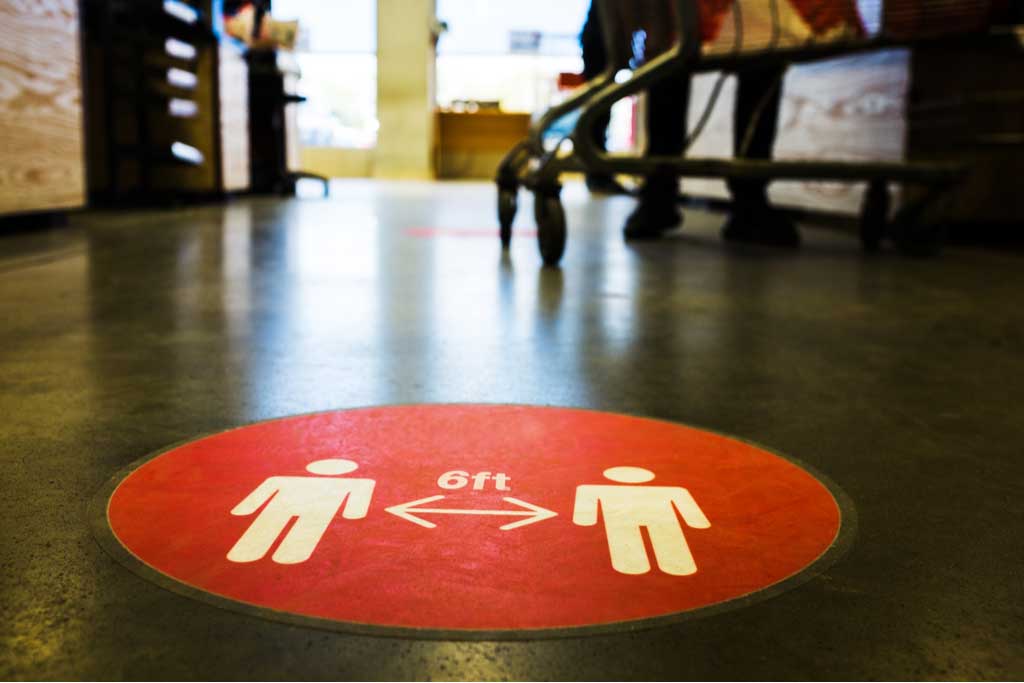In a leaked draft Pentagon memo obtained by Task & Purpose, the Defense Department (DoD) warned it should prepare to operate in a “globally-persistent” novel coronavirus (COVID-19COVID-19 \ ˈkō-vid-nīn-ˈtēn : a mild to severe respiratory illness that is caused by a coronavirus (Severe acute respiratory syndrome coronavirus 2 of the genus Betacoronavirus), is transmitted chiefly by contact with infectious material (such as respiratory droplets), and is characterized especially by fever, cough, and shortness of breath and may progress to pneumonia and respiratory failure. ) environment without an effective vaccine until “at least the summer of 2021.” Meanwhile more than 49,000 new cases of COVID-19 were identified in the United States on Sunday and the pandemicpandemic (pan·dem·ic) : an outbreak of a disease that occurs over a wide geographic area and affects an exceptionally high proportion of the population : a pandemic outbreak of a disease. has killed over 130,000 in the U.S. and 534,000 people across the globe. The United States now has over 3 million confirmed cases of coronaviruscoronavirus co·ro·na·vi·rus : any of a family (Coronaviridae) of single-stranded RNA viruses that have a lipid envelope studded with club-shaped projections, infect birds and many mammals including humans, and include the causative agents of MERS, SARS, and COVID-19 infectioninfection in·fec·tion | \ in-ˈfek-shən a : the state produced by the establishment of one or more pathogenic agents (such as a bacteria, protozoans, or viruses) in or on the body of a suitable host b : a disease resulting from infection, with 1 million of those confirmed in the last 30 days. Over 11.4 million people worldwide have been diagnosed with COVID-19.
As of July 1, 12,521 troops had been diagnosed with COVID-19. When that figure is added to the civilian, dependent and contractor counts, DoD’s overall number reached 18,071.
On the travel front, the European Union has banned U.S. travelers due to fears of spread of coronavirus. The 27-nation EU is expecting its economy to shrink by 8.3% this year. U.S.-Canada and U.S.-Mexico travel restrictions also have been extended until the end of July.
Coronavirus’s Shutdown Impact on the Economy
A team of economists at Goldman Sachs is calling on the federal government to institute a nationwide mandate requiring facial coverings in public spaces to halt the spread of coronavirus. The economists say the face maskface mask 1. A barrier device used in infection control to prevent health care providers from breathing or coughing on patients. It is also employed to prevent patients' sneezes and sputum from making contact with the health care provider's face or eyes or from being inhaled. 2. A device that covers the mouth, nose, or both of a patient who requires positive-pressure, noninvasive ventilation or continuous positive pressure-ventilation (CPAP). requirement would reduce spread of the virus by as much as 60% and save the U.S. economy $1 trillion.
Several states are re-instituting restrictions in response to Coronavirus. Miami-Dade County announced it would re-close restaurants, gyms, party venues and short-term rentals effective Wednesday. The county also declared that face masks are mandatory in all of Miami-Dade County, unless you are exercising or under the age of two.
- Face masks are now mandatory in public in California, Connecticut, Delaware, New York, Nevada, New Jersey, New Mexico, Oregon, Pennsylvania, Rhode Island, Hawaii, Georgia, Washington state, D.C., Illinois, Maine, Maryland, Kansas, Michigan, Pennsylvania, Rhode Island, Texas and Virginia.
- New York, New Jersey and Connecticut just announced they are adding three states to their list of quarantinequarantine quar·an·tine | \ ˈkwȯr-ən-ˌtēn : the period of time during which a person or animal that has a disease or that might have a disease is kept away from others to prevent the disease from spreading : the situation of being kept away from others to prevent a disease from spreading states, for a total of 19 hotspot regions on the list. If you’re traveling to the Tri-State region from the following states you must self-quarantine for 14 days. The states are: Alabama, Arkansas, Arizona, California, Delaware, Florida, Georgia, Iowa, Idaho, Kansas, Louisiana, Mississippi, North Carolina, Nevada, Oklahoma, South Carolina, Tennessee, Texas and Utah.
- 15 million more people are unemployed than in February of this year and more than 440,000 black-owned businesses expected to shutter permanently.
- 67% of businesses expect work-from-home to be long-lasting or permanent, according to a survey by Small Biz Trends.
Impact on Minority Communities, Children
- According to an analysis by the New York Times, coronavirus’s impact on America’s Black and brown communities has been disproportionately devastating.
- Children are developing systemic inflammatory response, called COVID-19 pediatric multi-system inflammatory syndrome. Children with the syndrome are developing brain lesions despite not having respiratory symptoms. The lesions have been shown to cause damage to the corpus callosum, which helps the brain’s two hemispheres communicate with each other.
- The Pentagon had considered banning enlistment for individuals who had tested positive for COVID-19. An interim guidance issued by the Department of Defense (DoD) that would have made military recruits who had been infected with coronavirus “permanently ineligible” was rescinded in late May. Military medical professionals are trying to determine whether respiratory damage from the virusvirus vi·rus | \ ˈvī-rəs : a disease-causing agent that is too tiny to be seen by the ordinary microscope, that may be a living organism or may be a very special kind of protein molecule, and that can only multiply when inside the cell of an organism is long-lasting or permanent, and whether that can be assessed. Other considerations include the likelihood of recurring flare-ups and the possibility that one bout of COVID-19 might not provide full immunity for the future.
Back to School Plans, Hybrid Schedule Considered
School districts across the country are working on plans that would allow for social distancingsocial distancing :the avoidance of close contact with other people during the outbreak of a contagious disease in order to minimize exposure and reduce the transmission of infection. upon reopening, including plans for hybrid online and in-person schooling and staggered schedules to reduce the number of students in classrooms for the upcoming academic year.
Meantime, the Trump administration is advocating liability protections for schools in any upcoming emergency relief package and underlining GOP support for helping parents with their child care problems. The Centers for Disease Control & Prevention (CDC) issued updated guidance on school reopenings that recommends symptom screening but not universal testing for the coronavirus when school reopens. “We are very much going to put pressure on governors and everybody else to open the schools,” President Donald J. Trump said in a White House news conference today.
In Florida, which saw more than 7,000 children infected with coronavirus, the state is requiring all primary education schools to reopen for full-time in-school instruction in August. Education Commissioner Robert Corcoran cited the fact that schools are crucial places in students’ lives that provide “nutrition, socialization, counseling and extra-curricular activities,” and said their reopening is critical to Florida rebuilding its economy. The emergency order comes as coronavirus cases in Florida top 206,000 and the daily number of new cases has reached record highs.
In higher education, Harvard has announced online-only classes for the full 2020-2021 academic year, while other universities are considering abbreviated semesters to avoid classes during the traditional influenzainfluenza in·flu·en·za | \ ˌin-(ˌ)flü-ˈen-zə : an acute, highly contagious, respiratory disease caused by any of three orthomyxoviruses: (1) or influenza A : moderate to severe influenza that in humans is marked especially by sudden onset, fever, sore throat, fatigue, muscle aches, inflammation of the respiratory mucous membranes, and cough, that has numerous variants caused by subtypes (such as H1N1, H2N2, or H3N2) of an orthomyxovirus (species Influenza A virus of the genus Influenzavirus A) infecting humans and various animals (such as birds or pigs), and that may occur in ... season.
On Monday, the U.S. Department of Homeland Security announced that international students are not permitted to take a full course of study through online classes during the fall semester if their universities transition to online-only learning.
Harvard and MIT announced Wednesday they are suing immigration officials over the measure, which would require international students who are pursuing degrees in the United States to leave the country or risk deportation if their universities switch to online-only courses. Nonimmigrant F-1 and M-1 students attending schools operating entirely online must leave the country or take alternative steps to maintain their nonimmigrant status such as a reduced course load or appropriate medical leave. The Student and Exchange Visitor Program removed temporary exemptions that permitted nonimmigrant students to take more online courses than normally permitted in the spring and summer semesters allowing them to maintain their nonimmigrant status during the COVID-19 emergency.


No comments yet. Be the first one to leave a thought.